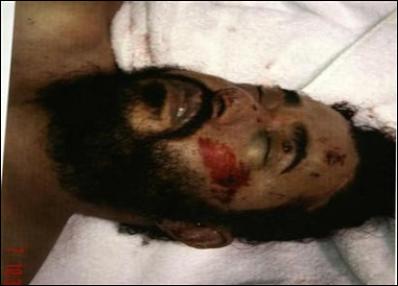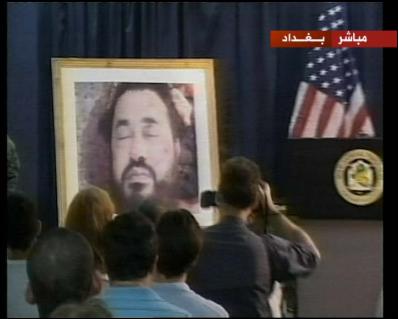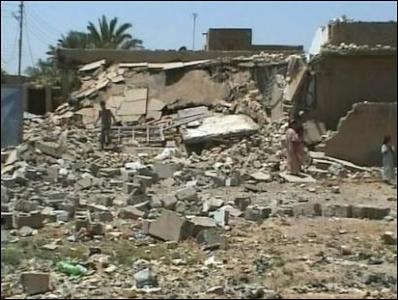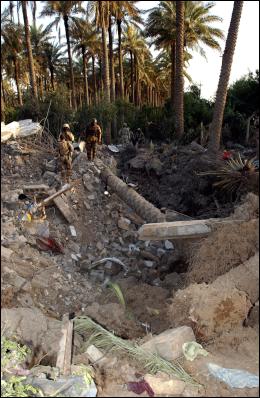Scoop: Sunni Deep-Cover Bods Fingered Al Zarqawi
State Of It: Sunni Deep-Cover Network Most Likely Fingered Al Zarqawi
By Selwyn Manning – Scoop co-editor
Contents:
*** Images Of Abu Musab al-Zarqawi (Mort)
*** Scoop Report: Sunni Deep-Cover Network
Most Likely Fingered Al Zarqawi With Al Qaeda's
Blessing
*** Video of Bush on killing Al Zarqawi + U.S. air attack
on Abu Musab al-Zarqawi's 'safe-house'.




Scoop Report: Sunni Deep-Cover Network Most
Likely Fingered Al Zarqawi With Al Qaeda's
Blessing
Since the purported Al Qaeda leader in Iraq,
Abu Musab al-Zarqawi, was killed June 7 by U.S. forces in
Baqubah Iraq, much speculation has centred on who or what
group fingered him to the American intelligence command.
Reports to date suggest Sunni representatives in the new
fledgling Iraq government look most likely.
The U.S. intel scenario goes like this: al-Zarqawi was most effective as a tactician chipping away at U.S. forces and continuing to inflame unrest between Sunnis and Shia insurgencies in Iraq.
The strategy worked for al-Zarqawi and frustrated the United States to the degree it most often focused its propaganda on him rather than Al Qaeda.
Accordingly, following the U.S. logic, while Al-Zarqawi's death is clearly a blow to Al Qaeda's operation in Iraq, it would on the surface also take from the Sunni community a most useful trump-card that it has used on many occasions. But is this a negative for the Sunni political leadership? No, far from it.
In the past, when Sunni interests have been compromised, Al-Zarqawi has been an effective tool. When negotiations between the dominant Americans, Shia, and Kurd sections had consolidated a tri-united power position, the Sunni camp had played the Al-Zarqawi card and reportedly blown someone or something up.
U.S. based intelligence think-tank Stratfor - which is often referred to as 'the shadow CIA' and packages and sells geopolitical, security, and global financial intelligence to corporations, political organisations, agencies, and media - states: "It (Al-Zarqawi) is the only reliable card that they (the Sunnis) have had to play, and they have played it often and to great effect. The Sunnis have also known that if their position within the new Iraqi government is to be formalized and cemented, they would have to rein in Al Zarqawi and his jihadist allies. If they do not, there was no deal."
The latter part of that statement is key to unpicking the mystery surrounding Al Zarqawi's killing.
Scoop contacts on the ground in Iraq working within the contractor sector suggested a U.S. pull out is expected. Security personnel (often mercenaries by another name) have been unable to extend contracts with their parent companies whose management have been unable to get commitments to extend engagement from U.S. authorities beyond the middle of this year. The word is that the U.S. theatre is being moved to Afghanistan where a jihadi uprising has intensified, all the while insurgency in Iraq has become more organised and targeted in its strategy.
Al Zarqawi had long been used by George W Bush, Donald Rumsfeld and others within the Administration as a bogeyman, whose legend was inflated to satisfy a simplified U.S. media that the insurgency in Iraq could be personified within the identity of one man.
Scoop columnist Michel Chossudovsky wrote: "evidence suggests… that Zarqawi was part of a Pentagon disinformation campaign launched in 2003, which was initially intended to justify the US led invasion of Iraq. This central role of Zarqawi as an instrument of war propaganda was recently confirmed by leaked military documents revealed by the Washington Post. The Pentagon had set up a "Zarqawi program".
"Military documents confirm that the role of Zarqawi had been deliberately 'magnified' with a view to galvanizing public support for the US-UK led war on terrorism. The Zarqawi campaign is discussed in several of the internal military documents. 'Villainize Zarqawi/leverage xenophobia response,' one U.S. military briefing from 2004 stated. It listed three methods: 'Media operations,' 'Special Ops (626)' (a reference to Task Force 626, an elite U.S. military unit assigned primarily to hunt in Iraq for senior officials in Hussein's government) and 'PSYOP,' the U.S. military term for propaganda work... (WP. 10 April 2006)," Michel Chossudovsky wrote.
Despite the fact that Al Zarqawi's legend had been inflated to suit the USA's propaganda needs, the fact remains he was a crucial figure, albeit an iconic figure, that represented the insurgency and jihad networks opposed to Baathist, Shia, and U.S political dominance.
Clearly, before authorising a U.S. forces 'bug out', the Bush Administration needed to show those back home, that it had got the 'Bad Guy' and that the new democratically elected government in Iraq was heading toward stability and able to combat insurgency spikes – a crucial factor in paving the way for U.S. backed investment by multinational corporate oil entities.
The word from within the U.S. contractor fraternity in Iraq has suggested a pull out of U.S. force was to happen later this year whether resistance to the occupation disseminated or intensified. Al Zarqawi's death provides the United States an opportunity to pull out with its chin held high even if the insurgency flash-fires around it. And even Stratfor is warning of intensified violence: "Even if the A Zarqawi network is shattered, there will be some outlying units that might carry out further bombings -- and, in fact, we do not know at this moment whether the network is shattered."
Since Al Zarqawi's death, a number of jihadi web sites have published messages from loyalists claiming allegiance the new "emir," or leader, of Al Qaida in Iraq: Abu Abdul-Rahman al-Iraqi who has in the past been heralded as the "deputy emir". It appears Al-Iraqi spent time with Osama bin Laden in Afghanistan and favours a lower profile to that of Al Zarqawi. Suicide bombings in Iraq are expected to continue, but will target U.S. and Iraqi forces rather than civilians from Shia and Kurd communities. U.S. Major General William Caldwell, the chief US military spokesman in Iraq, said an Egyptian militant he identified as Abu Masari, who trained in Afghanistan and established the first Al Qaeda cell in Baghdad, may succeed Zarqawi.
Through the Mujahideen Shura Council Abu Abdur-Rehman al-Iraqi issued a statement commenting: "Verily, the death of our leaders is ‘life’ for us, that will only reinforce our determination to continue the Jihad until the word of Allah is uppermost, for we will strive to obey Allah, the Glorified and Exalted, an this is of the greatest obediences to worship in such days. Signed, Abu Abdur-Rehman al-Iraqi - Vice Ameer of al-Qaida in The Land of The Two Rivers."
The question remains: was Al-Zarqawi's death the result of a one-off intelligence coup or a Sunni decision to turn him in? This has significant implications for the continuing internal political process in Iraq.
Iraqi Prime Minister Nuri al-Maliki said Friday, the Iraqi government will focus on rebuilding infrastructure, healing sectarian divisions and bolstering the security forces in order to stabilise the country.
There is a long way to go before stability is achieved in Iraq. Following Al Zarqawi's death, three oil engineers were killed while they were traveling on the road between Baiji and Kirkuk - a key oil production centre in northern Iraq. An oil pipeline in Kirkuk was also attacked and an engineer from Iraq's state-oil company has been kidnapped. Gunman kidnapped a senior Iraqi oil official in Baghdad. Muthanna al-Badri, director general of the State Company for Oil Projects, was driving from the ministry to his home in the predominantly Sunni neighborhood of Azamiyah in north Baghdad when the attack occurred. Also, at least 15 persons were killed when two car bombs exploded in Baghdad's mainly Shia areas on Thursday.
This was followed up by U.S. forces carrying out 39 raids on June 9 against insurgent targets throughout Iraq. Caldwell said the information was gathered in searches conducted after the killing of Abu Musab al-Zarqawi and helped direct some of the strikes.
If one accepts Stratfor's theory, it would appear Al-Zarqawi's use-by-date had expired and that Sunni leadership, that had previously been using his insurgent army for its own political gain, now realised more benefit from demonstrating power and influence over resistance fighters – by having Al Zarqawi rubbed out, it cemented its position in the new Iraq government for as long as the Americans, the Shia, and Kurds believed it to pull the insurgency strings.
This thinking is of the United States' creation.
U.S. intelligence has been injecting ideas into think-tank reports throughout the past month suggesting the Sunni camp must instruct its network of insurgents to de-escalate civilian attacks, sectarian violence, and ease its resistance to the U.S. occupation.
It seemed an impossible task – but the U.S. reports insisted that there would be a clear indication by mid-June and more significantly by early July as to whether Sunni representatives were able to display control over insurgents loyal to the Sunni cause – and therefore garner a powerful position in the new government.
This week Stratfor stated the Sunnis have met their side of the deal: "It strikes us as far more than a coincidence that within hours of the confirmation of Al-Zarqawi's death, the Iraqi Parliament put the finishing touches on the new Iraqi government. Baghdad now sports an internationally acceptable, domestically chosen government that includes participation from all of the major sectarian groups."
It continued: "Al-Zarqawi was attacked by two F-16s, each of which dropped a 500-pound bomb, not by a Hellfire missile launched from a Predator drone. Predators are dual intelligence-gathering/assassination tools. Pairs of F-16s are more likely to be used when there is pre-existing intelligence that results in a tasking. U.S. forces selected their weapon very carefully to be low on fragmentation or fire to maximize the chances of the quick recovery of an easily identifiable corpse. Al-Zarqawi was not found, he was sold out. A political deal was made, and the Sunnis have delivered on their end."
Clearly, an individual close to Al-Zarqawi was able and authorised to detail his exact location. The information fed up the chain of command, through the Sunni political leaders, and passed to the Americans. Realistically, this could only occur with the 'blessing' of Al Qaeda's leaders in hiding.
Only hours before Al Zarqawi's killing, strategypage.com (an agency that analyses military and governmental strategy) suggested Al Qaeda was tiring of Zarqawi's tactics: "Zarqawi's recent audio messages have not only attacked the U.S. and the Shia-dominated government in Iraq, but also Iran. He's even claimed that the U.S., Iran, and Shia in general, are in cahoots to destroy Islam. He has also called for continued attacks against Shia. "Except for his verbal attacks on the U.S. and the Iraqi government, he is almost totally distanced himself from the central leadership. Other al Qaeda leaders have been trying to down play anti-Iranian and anti-Shia rhetoric, and have been strongly discouraging attacks on civilians," the strategypage.com report stated. The report concluded that as Zarqawi had become a loose cannon and that his actions were handicapping Al Qaeda's efforts, it seemed reasonable to expect that an accident would "befall him at some point in the near future" – the suggestion was that if Al Zarqawi "went out in a blaze of glory" Al Qaeda would get rid of a problem and gain another "martyr."
Despite this, Al Qaeda's deputy leader, Al-Zawahiri praised Abu Musab al-Zarqawi over night, but did not mention his death.
Shortly after the U.S. unleashed its two 500lbs bombs on the Al Zarqawi target, a Jordanian official conveniently reported Jordan's intelligence agency had tipped off the Americans as to Al Zarqawi's whereabouts.
Al Zarqawi was a Jordanian by birth, and Jordan may have fed intelligence into the mix, but it appears the official's statement was a red herring.
Immediately after Al Zarqawi's death, the United States' first offensive was to carry out 17 raids specifically against the Al Zarqawi network. Clearly, somebody painted that network with exquisite care for the Americans.
Whoever it was had to have superb intelligence about a highly compartmentalised operation. It is possible that a single person provided all this, but we find it more likely that it was compiled from a number of sources.
Certainly now, Al Qaeda has the best of both worlds: a new Martyr to fuel the Jihad, and a bin Laden protégé who is less inclined to parade before cameras but just as brutal in his pursuit of the network's goals in Iraq.
Tips:
1. Watch for sustained follow-on operations by the U.S. and Iraqi military against jihadists, which would suggest broad cooperation on the part of the Sunni leadership.2. There is the critical question of what the non-jihadist insurgents will do now. If there is a political agreement behind the scenes, their operations will subside.
3. Most importantly, will be what is spoken in the Mosques throughout Iraq – the mood will be an indicator of whether the new Iraq government is indeed made up of true representatives of the sectarian groups that make up the Iraqi community.
4. Watch the code of conduct displayed by the Americans as they orchestrate their sweep of Iraqi towns and villages and watch for surges in guerrilla styled resistance building to compliment Al Qaeda's wish (in the absence of Al Zarqawi) that the Jihad be refocused on the United States solder and his coalition counterparts.
In conclusion: Stratfor suggests the Sunnis are now in a pivotal position and in power over whether Iraq heads toward stable government and recreation. Should this be correct, the United States will steady its sabre rattling that has been in evidence over the Iran nuclear power issue and prepare to transfer its theatre from Iraq to Afghanistan and thus allowing for a 100,000+ contingent to remain in the general region.
"The stage is set for a rapprochement between the United States and Iran. This is likely far further along than anyone realizes. The key sticking point in the relationship for the United States is not the nuclear question, but the future of Iraq. Iran, simply put, does not want to be invaded by Iraq again. With a government in place and al-Zarqawi dead, logic dictates that the Americans and the Iranians have already had their meeting of the minds. The rest is punctuation."
The Bush Administration rhetoric however continues: Iran has until the G8 meeting, which begins July 15, to accept the incentive offer put forward by the five permanent members of the U.N. Security Council and Germany, and abandon its nuclear programme. Bush reiterated Friday that Iran has "weeks, not months" to accept the proposal.
The prize in this part of the world is always oil and in Iraq's case, multinational oil companies have been waiting for stable government in Iraq before investing in "the Iraqi oil complex". Iran too has been facing cuts to the number of oil barrels per day that it has exported. It has much to benefit (internal political stability for one) by returning to mid-2005 production.
 Scoop Doco: Jihad Battle Mounts Against West's Propaganda - The United States dominion over 'psy-ops' and propaganda is no longer unchallenged. Islamic insurgents throughout the Muslim world are producing digital video clips with ever-increasing sophistication. The products of this technological revolution carry a double-edged message of 'glory' for youthful 'martyrs' and vengeance against the West. Scoop has obtained video footage - delivered via underground networks and otherwise - originating from Iraq, Iran, Afghanistan, Chechnya, Turkistan, Algeria and Palestine. The propaganda's message suggests the Islamic fight against U.S. imperialism and that of the West is spreading - becoming more sophisticated. See... Psy-Ops Countered By Islamic Digital Propaganda
Scoop Doco: Jihad Battle Mounts Against West's Propaganda - The United States dominion over 'psy-ops' and propaganda is no longer unchallenged. Islamic insurgents throughout the Muslim world are producing digital video clips with ever-increasing sophistication. The products of this technological revolution carry a double-edged message of 'glory' for youthful 'martyrs' and vengeance against the West. Scoop has obtained video footage - delivered via underground networks and otherwise - originating from Iraq, Iran, Afghanistan, Chechnya, Turkistan, Algeria and Palestine. The propaganda's message suggests the Islamic fight against U.S. imperialism and that of the West is spreading - becoming more sophisticated. See... Psy-Ops Countered By Islamic Digital Propaganda
ALSO:
![]() Scoop Audio: Scoop's Selwyn Manning and 95bFM's Simon Pound discuss: the Scoop doco " Psy-Ops - The War On Your Opinions" and how NZ's intel agencies failed regarding Timor Leste.
Scoop Audio: Scoop's Selwyn Manning and 95bFM's Simon Pound discuss: the Scoop doco " Psy-Ops - The War On Your Opinions" and how NZ's intel agencies failed regarding Timor Leste.


 Keith Rankin: America's Imperial 'Gift' - 'Crusader Democracy' Versus 'Christian Nationalism'
Keith Rankin: America's Imperial 'Gift' - 'Crusader Democracy' Versus 'Christian Nationalism' Gordon Campbell: On The West’s War Against Iran
Gordon Campbell: On The West’s War Against Iran Binoy Kampmark: Condemning The Right To Self-Defence - Iran’s Retaliation And Israel’s Privilege
Binoy Kampmark: Condemning The Right To Self-Defence - Iran’s Retaliation And Israel’s Privilege Gordon Campbell: On The Making Of King Donald
Gordon Campbell: On The Making Of King Donald Binoy Kampmark: Rogue States And Thought Crimes - Israel Strikes Iran
Binoy Kampmark: Rogue States And Thought Crimes - Israel Strikes Iran Eugene Doyle: The West’s War On Iran
Eugene Doyle: The West’s War On Iran